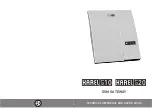
P-660HWP-Dx Support Notes
All contents copyright © 2007 ZyXEL Communications Corporation.
39
FHSS uses a narrowband carrier which hops through a predefined sequence
of several frequencies at a specific rate. This avoids problems with fixed
channel narrowband noise and simple jamming. Both transmitter and receiver
must have their hopping sequences synchronized to create the effect of a
single "logical channel". To an unsynchronised receiver an FHSS transmission
appears to be short-duration impulse noise. 802.11 may use FHSS or DSSS.
6. Do I need the same kind of antenna on both sides of a link?
No. Provided the antenna is optimally designed for 2.4GHz or 5GHz operation.
WLAN NICs often include an internal antenna which may provide sufficient
reception.
7. Why the 2.4 GHZ Frequency range?
This frequency range has been set aside by the FCC, and is generally labeled
the ISM band. A few years ago Apple and several other large corporations
requested that the FCC allow the development of wireless networks within this
frequency range. What we have today is a protocol and system that allows for
unlicensed use of radios within a prescribed power level. The ISM band is
populated by Industrial, Scientific and Medical devices that are all low power
devices, but can interfere with each other.
8. What is Server Set ID (SSID)?
SSID is a configurable identification that allows clients to communicate to the
appropriate base station. With proper configuration, only clients that are
configured with the same SSID can communicate with base stations having
the same SSID. SSID from a security point of view acts as a simple single
shared password between base stations and clients.
9. What is an ESSID?
















































